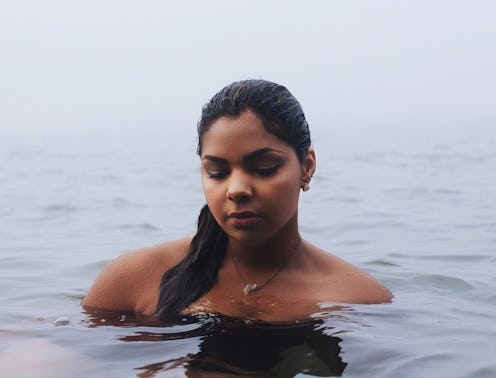Fashion
How Swimming In The Ocean Can Mess With Your Skin

The idea that ocean water will improve breakouts is one that I have tested on numerous occasions. As someone with acne-prone skin, I have to say that I've had mixed results from playing in the ocean. Sometimes my breakouts seem to really clear up, while other times they only get worse. So what gives? Does ocean water actually heal pimples? To get to the bottom of this, I emailed with New York City dermatologist, Dr. Hadley King, MD. She explained how the idea that ocean water will help with acne came around, and what conditions make this solution true or not.
If you've ever gargled salt water when you had a sore throat or used it to irrigate wounds from having teeth removed, you probably know that salt water does have some healing properties. But Dr. King notes that one of the key components to this approach is sterility. Because ocean water is not sterile like saline solutions that are meant to treat wounds, there are certain variables that need to be considered to determine if ocean water can actually help acne, or if the water will just hurt it. According to Dr. King, these variables are "the state of your immune system, the state of the wound (acne in this case), and the state of the ocean water in which you are swimming."
Although salt water could help heal acne because of its ability to dry up skin oils and reduce bacteria on the skin, says Dr. King, the severity of your acne, along with your immune system and part of the ocean you're in could have an effect on just how well the salt water treats your breakouts. Whether due to natural causes or human activity, Dr. King explains that there are parts of the ocean where a lot of bacteria are present. Because of this, "if acne lesions are severe or open, or if your immune system is compromised in any way...then extra caution should be taken," says Dr. King.
If you've noticed that salt water does tend to help your acne, or you want to try it out as a natural, home remedy, there are safer and cleaner ways to treat your acne with salt at home. Instead of exposing your acne to additional bacteria from the ocean, or over-drying your skin by staying in the water too long (which could actually make your acne worse), try one of these DIY remedies instead.
1. Saltwater Solution
A quick and easy way to make your own saltwater treatment at home is to dissolve about one tablespoon of sea salt into one cup of warm water. Then, you can saturate a cotton pad and wipe it over any affected areas, or pour the solution into a spray bottle and mist it over larger areas.
2. Sea Salt + Coconut Oil
For a more hydrating salt mask, try combining one cup sea salt with one half cup of coconut oil. Massage the mixture into your skin, and let it sit for about five minutes before rinsing off with water. This treatment is especially good for those with normal to dry skin, as salt can be quite drying, and the oil helps balance the skin by adding back some moisture.
3. Saltwater Bath
If you struggle with body acne, another approach is to add sea salt to your bathwater. Simply mix about two cups of sea salt into your bath and soak for around 15 to 20 minutes. After your soak, be sure to rinse off with warm water so there is no salt residue on your skin.
4. Sea Salt + Honey
Honey is another natural ingredient that works well to clear up acne. Try mixing two teaspoons of sea salt with four teaspoons of raw honey, and applying this to clean, dry skin. After about 15 minutes, use your fingers to massage the mixture into your skin before rinsing with warm water.
5. Simple Salt Cleanser
Clinque Liquid Facial Soap, $17, Sephora
If you're not much of a DIY-er though, but still want to add salt to your skincare, one of the simplest things you can do is add about one half-teaspoon of sea salt to any mild facial cleanser. Gently wash your face, and rinse with warm water.
And of course, after any treatment using salt, don't forget to moisturize.
Images: Unsplash, SplitShire, 25891, Abdecoral, StockSnap, puderundpinsel, melati411/Pixabay